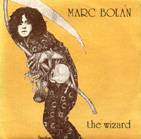RIGGS O’HARA - THE
MISSING LINK TO MARK FELD
Martin Barden has been
a well known fan on the Bolan scene for years.
I'm very glad that he allowed me
publishing the article that had been previously seen in Record
Collector and Rumbling, that tell us about his meeting with the
man Marc refered to as 'The Wizard' martinbarden@hotmail.com
I would like to thank
George Rab from the bottom of my heart for his assistance in
compiling this page.
He provided many pictures of which
some were never published before.
Please also read 'The Wizard' by
Gavin Ross
Riggs
O’Hara is one of the legendary figures from Marc Bolan’s early
life about whom almost nothing is known. All this changed
recently when I came upon his name in a local magazine which was
promoting the opening of Riggs’ new theatre, housed in a
converted Post Office in Ladbroke Grove. A meeting was arranged
for Friday 1 August, and shortly before mid-day I was welcomed
into the O’Hara apartment by a medium-height, slightly stocky
man with a shock of tousled blond hair and a booming
mid-Atlantic actor’s voice - it was Riggs. For over two hours he
looked back over 30 years to a friendship of little over 12
months, but one which was to change radically the life of
aspiring star Mark Feld…
This is the full length interview as
published in Rumbling #22, an abridged version of which appeared
in the September 1997 issue of Record Collector
magazine.
| Have you
ever wondered why you haven’t been contacted about
Marc Bolan before now?
I was quite shocked - I
saw a biography and thought why the hell didn’t
anyone get in touch with me and ask me about it?
We met at a friend’s
flat. He was visiting this guy whose name I have
absolutely forgotten, I turned up there and started
to talk about the theatre, and we went out for a cup
of tea or whatever. This was around 1964 and his
name was Mark Feld, and that’s what he was calling
himself. Anybody who tells you that they knew him
before, this was before that! There wasn’t anyone
else around. He wasn’t a loner but he wasn’t with a
particular crowd of people and he didn’t know a lot
of people. Anyone that he met, he met thorough me.
It was a period of education for him, of going to
theatres and opening his eyes. It’s not what I set
out to do but it’s what he wanted. I don’t remember
Mark having any friends apart from me. He would
never say ‘so and so’s coming over tonight’, or ‘can
so and so go with us to the theatre’, never.
We got on terribly well,
he was very sweet with a very dry sense of humour.
The lines would come from leftfield and you’d go
‘where the hell did you learn to say that?!’
|

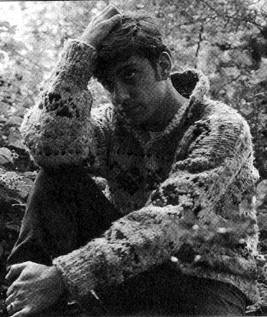
|
In his notebooks he was
signing himself as Marc Riggs at one time - did you
know that?
Oh how sweet to think
that he thought that much of me, it’s wonderful. I
never knew that. We more-or-less shared a flat in
Lonsdale Road, Barnes. I had an enormous - for those
days - flat for something like £12.00 per week, and
Jimmy Bolam was living there as well.
When Mark changed his
name, I was very proud of the idea that he wanted to
change his name to mine, I thought it was a terrific
idea and loved it. Jimmy, though, got very offended
as he had started the ‘Likely Lads’ and thought it
really outrageous that Mark would take his name, and
thought it would take something away from him, so
Mark just changed the ‘M’ to an ‘N’, as simple as
that. Nothing to do with Bob Dylan. Mark didn’t take
it because he admired Jimmy, he just liked the sound
of it. There was never any question that there would
be any competition between them, Mark always knew
that he was going to be more famous. He couldn’t
understand why Jimmy was upset, he thought it was
absolutely ridi-culous that Jimmy would think he was
going to be as big as Mark was. He wasn’t having an
identity crisis, he was too well adjusted, he was
trying to figure out what would be the catchiest
name to get him through the door.
|
And Toby Tyler?
I had a letter with that in it. He
sent me a picture of Roy Orbison and said ‘doesn’t he look like
Rodney Bewes?’, because Rodney Bewes was doing the ‘Likely Lads’
with Jimmy Bolam.
Sorry I
haven't phoned. But I will as soon as I've got good news
(recording contract wise) Speak to you soon Marc (or my stage name (he he) Toby Tyler
lots of love from
whoever I may be
x x
xx xx xx xx
PS I hope you like my
poem I am (?can't read the word?) Olgar
the Ostrich
Is it Roy
Orbison or Rodney Bewes (you may never know) ( Martin
Barden's 2001 report of the letter )
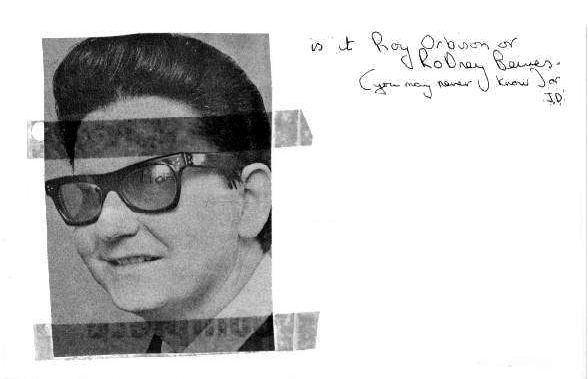
Exhibited at Bolanfest 2000
 Toby Tyler was a name from a comic book or
something. He was just looking for a name that was theatrical.
Toby Tyler was a name from a comic book or
something. He was just looking for a name that was theatrical.
I guess in those days we had a
glamourous lifestyle, decorating the flat dramatically, the hall
was painted dark red, curtains with Greek columns painted on
them, all leather furniture. We had matching knives and forks
and plates and coffee in little cups brought in on trays. It was
that whole ‘60s thing of everyone living glamourously. We were
quite regal in our infantile way! This was for over a year. I
can’t ever remember living any differently whether I had any
money or not...
We would hire chauffer-driven
Bentleys and go places, it was affordable then and I did it. I
always had my own car and flat and ate 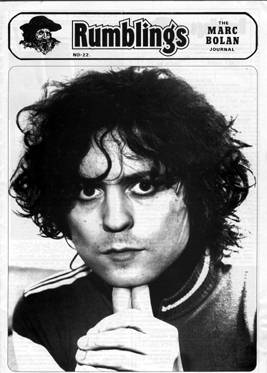 in restaurants and went to first nights.
It was a very formative period of his life at 16 and 17... He
always left his things at home, but if he found somewhere else
to stay for a while, he stayed there.
in restaurants and went to first nights.
It was a very formative period of his life at 16 and 17... He
always left his things at home, but if he found somewhere else
to stay for a while, he stayed there.
He had short hair all the time I knew
him and he was always smart and well dressed. He never wore
jeans or ‘trendy’ clothes, he always wanted to look properly
dressed in tailored clothes. He was like a ‘40s/’50s boy next
door.
If anyone influenced him at this time
it was Elvis. That’s what he aimed at, that kind of performance
style all the time.
Mark was King of the Mods when he was
13 and he got all of those articles about him, and he never
forgot the attention. Once he’d seen his picture all over the
Evening Standard he had decided. He would have gone
any route where a door opened. If an acting or a filming door
had opened he would have gone through that. He actually went to
an audition for ‘Performance’ and he did quite well - there was
a possibility, you know, although they went with the name [Mick
Jagger] in the end. I don’t know if he was ever on ‘Orlando’,
but because of his association with me he got involved with what
he heard about films and televison being made. But he didn’t
have an agent and didn’t know what agents were. He was really
thinking about a manager who was going to handle all of that
side of things. But he was much too smart for all that, he was
always smart.
I would imagine none of his managers
were smart enough to manage him, to push him forward as well as
he could push himself. If we’d stayed in touch I probably would
have said ‘right, you’ve got to find a show to do on stage, or
you’ve got to find something a bit bigger’. My attitude was
always ‘you’ve got to do more’. But he knew that in order to get
into acting you had to do a three year drama course, an end of
term show, be seen by an agent, get signed up. There was no way
he was going to do that. He knew that 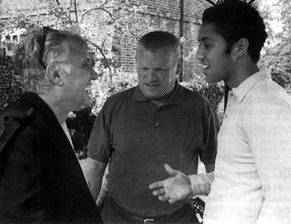 the only thing you needed no
qualifications for was the pop industry, none whatsoever.
the only thing you needed no
qualifications for was the pop industry, none whatsoever.
We were watching ‘Top of the Pops’
and there was some guy wiggling around with his guitar, and he
said ‘anybody could do that’. He got up and he did it. He was
first a learner, second was any kind of artistic talent. He was
self educated in almost every respect, he even taught himself
his own accent. He decided one day to teach himself to speak
properly, and he did. He never went to school.
One of my best friends was Sandra
Caron, whose sister was Alma Cogan, who used to give the parties
of her life. You would walk into a party of Alma Cogan’s and
you’d have the Beatles and the Stones, the Andrews Sisters,
Ethel Merman, Peter O’Toole, Sammy Davis Jnr, just everyone
you’d ever heard of in one room. Mark never moved on anybody,
made a B-line for anybody because he thought they could help him
in his career, never.
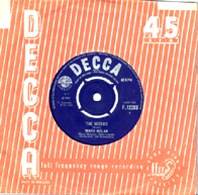

|

A major part of the
Marc Bolan Legend involves the trip you and Mark
took to Paris.
It was a long weekend and
we did it proud, we did everything. He’d never been
to a foreign country, and we did everything, late
night crazy clubs with extraordinary elaborate
reviews, a boat trip on the Seine, the theatre, the
museums, it was his first eye-opening experience and
it was jam-packed - we did every single tourist
sight as well as every cultural sight, and I’m sure
for someone like him it seemed like six months -
from the Eiffel Tower to the Louvre to a big musical
show. We stayed on the Left Bank on the Rue St.
Bernard at the Hotel Montana. It’s one of those
things that you do for someone who has that kind of
brain, and you say ‘You gotta see this, I wanna be
the one to show this to you.’ At that time I was
probably showing off that I’d been to Paris, that I
knew it, that I had friends there...
He was always very cool -
I would never have said that I could actually look
at him and recognise that his eyes were out on
stalks at the wonder of everything he was seeing. He
recorded it, he almost didn’t experience it, he
recorded, but he had the time of his life.
As for the Wizard - there
was only me. The kind of stories that Mark would
invent about the Wizard being somebody else was his
way of protecting me. He never knew anybody but me
in that time.
I remember when I had to
go to New York for two weeks, and I left him behind.
When I came back it was the first time that I’d ever
gotten the feeling that he missed me because he was
dependent on me, although it wasn’t a dependence
that I was aware of. He was practically waiting at
the door; he was in the flat because he had a key.
It was also the time that I realised that he cared
about me, because he wasn’t the kind of person who
showed how he felt.
Mark didn’t pick guys up,
he just didn’t. If I could say anything about Mark’s
sexuality, I think that all of his sexual drive was
invested in what he wanted to be and do. Second of
all there was no way that he was gay, or even I
would have thought bisexual. If he went to bed with
a man it was because he had some kind of affinity
with that person, some kind of understanding,
liking, caring, whatever.
|
He wasn’t
somebody who went out on that kind of scene. He was
never sexually motivated towards men, never. If he
happened to feel that way for you, then that was fine,
but... I don’t know what happened when I stopped
seeing him, but I just can’t believe it. He never went
to gay bars, discos, he never went to anything like
that, he just wasn’t interested.
He had a tremendous
amount of support from his family - mother, father,
brother - they supported anything he wanted to do.
They never said ‘where have you been’ and ‘you
haven’t been home for three days’ or ‘when are you
going to get a job?’ They accepted all of the
changes he would go through.
I had a Triumph Herald
and I used to drive him back to Tooting to his
family. I met his parents and his brother, really
nice caring people. His mother would have championed
him whatever he did, anything that he wanted. I was
never aware of any opposition from his father. And
his brother treated him like he was the little
brother with all of these ideas and dreams. Mark
would deliberately slip into the old accent every
once in a while and I would laugh...

Only one Hotel seems to fit
99% the description :
Hôtel Le Montana, 28 rue St
Benoît,
75006 Paris


When I met Mark, Phyllis
was working in Berwick Street, and he talked about
the ‘2is’ as though he’d been there but it was
before his time. We would walk down Old Compton
Street and he’d say ‘that’s where it was’, but you
know... I think that he invented the myths to go
with the invention of the character.
In those days the only
places you could go after 11 o’clock were coffee
bars and there were only one or two of them. He was
more interested in going to the Ad-Lib which was
then the only and the first discotheque, and I could
get in there as I was friends with people who owned
it. You would find everybody you ever dreamed of in
this one place, from the leading actors to American
pop stars - everyone. There was nowhere else to go.
|
In the ‘60s
every single day was a discovery. You’d suddenly find
late-night places and you would go in and hear Tamla
Motown records for the first time ever, because in
those days the only access you had to music being
produced outside the country was Radio Caroline.
I had a record player in
my car - another one of those ‘60s gimmicks, where
you used to slip in the 45s - and I only ever had
Tamla Motown in there, and that’s where he got it
from. I still am mad about them, I’ll still go for
Martha and the Vandellas over the Spice Girls any
day! I always loved that music, I was one of those
people who was involved in Rhythm and Blues before
Tamla Motown. You wouldn’t have known about Tamla
Motown at that time hanging around the English
scene. I would always say ‘nobody can do that’ - the
way they managed to make those sounds and the
openness and using the gospel sounds of their voices
to make these pop records. I was mad on Aretha,
Gladys Knight... Dusty was another of mine and
Mark’s favourites, I thought she was the only
[non-American] one who could cut it, she was
spectacular, fabulous.
I paid for his first demo
disc, which I am sure has disappeared. It wasn’t
with a group, just a small studio, getting something
on a tape and I think it cost something like £20.00.
I can’t remember the song but I don’t think he wrote
it, and it wasn’t ‘Blowing in the Wind’.
|
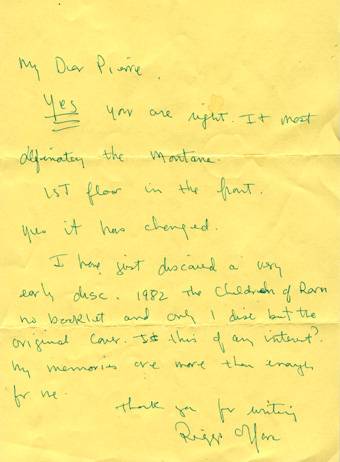 My dear Pierre,
My dear Pierre,
Yes, you are right. It most
definately the Montana.
1st floor in the front
Yes, it has changed...
Thank you for writing.
Riggs O'Hara
| Could it
have been ‘You’re no Good’ by Betty Everett?
It might have been. Betty
Everett was fabulous - he got that from me. He
didn’t have the warble in those days, quite a thin
voice although he stood right in front of the
microphone, and I don’t think it was him playing the
guitar. It was a smallish room, on the ground floor
I think, and just one of those places you rented.
There was no producer there, and I didn’t know
anything about that field. I was a bit snobbish
about that sort of thing at that time so I was just
pleasing him because that’s what he wanted to do.
There was nothing in my mind that said this was
important or that this was a career, although I knew
that was probably the direction he would go in.
But I wasn’t interested
in the pop industry, I was interested in being a
serious actor. I was involved with the Royal Court
which was the only thing to be involved with at that
time. And also I was so theatrical that he would get
Noel Coward, he would get Judy Garland, all that
kind of theatrical stuff as well as a basis, as I
believed that was what the theatre was about.
|
| I think we went to see
something called ‘Black’ something - a gospel
show from America where they were all in robes and
singing, and they all did these wonderful gospel songs
and we went to see that.
I have to emphasise that
there is no way that I take credit for anything that
he did and he discovered, but if he was influenced
by all those things I am where he got that
influence, because that’s the kind of music that I
played and that was the kind of life that I lived.
He was aware from the first that image was more
important than talent, he was always aware when he
would get up and do those wiggles, and he was a
funny kind of awkward mover, it was jerky. I would
never have said at that time that that kind of
movement was sexy.
He never gave you the
feeling as though he was using you or anyone. He
wanted to learn, but he didn’t pick your brain, he
wanted to know everything about the business.
|
From me he
learned about the theatre - I’m not going to take
credit for this but anything that was theatrical about
his advancement must have come from that period,
because his whole image [later] was incredibly
theatrical, and he wasn’t when I met him.
Folk was very fashionable
at the time and he had the little cap and a leather
coat.
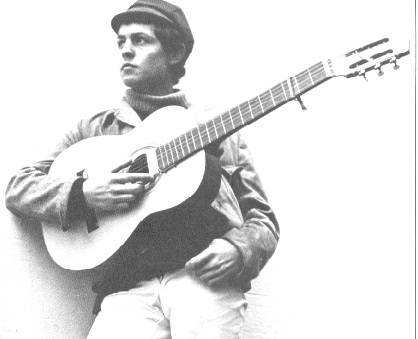
I bought him a Mongolian
Lamb coat with embroidery on the suede and the fur
sticking out around the collar, but he was always
very neat, he never really liked things that were
frilly or fuzzy. When you look at him now in costume
he’s terribly neat. He was tidy, very precise,
always putting everything in its place, never a
mess.
|
 |
| When we
finally went our separate ways - and there was
absolutely no problem about that, none whatsoever - it
was just the right time for both of us, no row, no
fight or argument, even after that when he would call
or keep in touch he would only ever call me if he had
good news, he never called and said ‘I need help’ or
‘I’m desperate, I need this or that’, never, he only
ever called to say ‘Oh I’ve been doing this gig’ or
‘I’ve got this demo’...
But he was always going
to invent his own style - the rest was his training
ground, his learning-through-doing.
|
| Did
you watch his career from a distance having lost
touch?
Yes we lost touch because
I was back in New York but we never lost faith.
Friends of mine would run into him and he would ask
how I was. I would always follow how he was doing
and was very pleased for him. I would like to be
able to say ‘proud of him’ but it’s not a word you
can use because he did it himself.
We used to marvel at the
degree of his fame, we’d read things in the
newspapers [in New York], you’d walk in the Village
and see shops called T.Rex, and you’d think ‘this is
unbelievable.’ I was always thrilled for him - he
got what he wanted.
It was from getting into
my circle of people that he realised what the
community of the entertainment industry was like and
that he really wanted to be a part of that
community. There was nothing devious or obvious
about his wanting to know things and learning
things, you never felt as though you were having
your mind gone over or were being drained or wrung
dry, he just absorbed, he would watch.
That period was very
important for him: it tipped the balance between
sitting at home thinking ‘I wish I could do
something’ to being involved in the community and
knowing that it’s not just a job, it’s a life, and
you choose it as a life, and everything you do is
motivated around people who are in it and where they
go.
He wasn’t doing gigs when
I knew him so I never saw him play live, and I never
bought a record. When I see him on TV I always see
the little boy behind the image. I’m always amazed
at the professionalism and the style that he
invented. When you see him all dressed up like that
I just can’t help remembering the little boy with
the short hair who said he wanted to be a pop star.
|
Did
anybody ever find a little green statue of Pan? I
bought it for him at Camden Market. After we’d gone
our separate ways we got together and went down to
Camden Market and there was a shop right on the corner
of the market and there was this little statue. He
said ‘I like that’ and I bought it for him
I have no doubt that he
would have gone into films. I think he got caught up
in this pop thing, and I don’t think there was
anyone around him at that particular time who
thought about anything other than the pop industry.
He was only ‘unmanageable’ because these managers
wanted more of what was selling. There was no
manager who was saying ‘why don’t you try this, why
don’t you try that.’ He was acting an image as Marc
Bolan, but could he have acted? Who can’t! Mark,
knowing me and my circle of people, there would have
been no way that I wouldn’t have read a script he
was offered and said ‘this is crap’ or ‘this is not
crap’, or I’d have handed it to people that I knew
who were successful in the business to say ‘have a
read of this’. There is no way that I wouldn’t have
helped him through every single ounce of his
performance - without the director knowing - that he
would have come home and I would take care of all
that. It’s just that there are not many people
around like that. The person I knew was no trouble
at all. If he became trouble later it was because
there was nobody around him to take the pressure
off, nobody around him who had any ideas bigger than
his.
He ran into my friend
Sandra years later at Apple when he was friends with
Ringo Starr and he saw Sandra come in, and the first
thing he said to her was ‘Where am I [Riggs] and how
am I?’ I was in New York - I went back at the
beginning of the ‘70s for 10 years. Mark’s peverse
way of saying that Elvis never came to the UK was
not to make it in the States!
|
He
was never money orientated, he was more motivated by
work. He knew you had to keep moving. I didn’t know
that he’d lived in the States. I would have thought
he’d have hated living in California. He was a
Londoner, he’d have been happier in New York.
Aside from that day when
he decided that he should leave, the day when we
went to Camden Market and bought that statue was the
last time I spoke to him. I heard about the accident
pretty much when it happened because there were a
lot of people that knew that I knew him so they
immediately got on and said ‘Hey have you heard?’ I
don’t know any of the tragic side of his life - I
never saw that in him, never saw the pain. I never
saw that when I knew him. He had enthusiasm and
energy and the will to succeed, he never had any
problems or pain, he never wanted for anything.
I find it so
extraordinary that those days had so much influence
on him. What I regret more than anything else is
that in his down periods he never phoned, but he was
not that kind of boy. If he’d have called me when he
was going through a rough patch I would have been
there in a shot and I’d have sorted it out. He just
wouldn’t call me with bad news but I wish he had.
It’s so hard when you
hear things about someone that you knew so well at
that time, but I can only tell you what I saw and
what I knew, and all of the myth that has grown up,
he invented that myth.
I find it so difficult to
believe that he was into drugs - I can only say that
it must have been because of the pressure and
tension of having achieved what he set out to
achieve, and it wasn’t enough and there wasn’t
anybody to kick him up the rear and say, ‘Try for
this play, try for this movie’. With Pop stars, when
they’re kids all they want is a number one record,
when they get a number one record they want a number
one album, and the rest of their life is trying to
repeat their original success.
|
He
always knew that I felt that the pop industry was
beneath me! I was that much of a theatre snob. I was
musical comedy trained and then I decided I wanted to
be a straight actor, and theatrical converts are the
worst sort of people in the world! West End musicals
were beneath me and I only wanted to be in serious
dramas that changed people’s lives, and it’s taken me
all my life to get to the point where I have now a
building where I am actually doing things that are
involved in that.
My complete image of Mark
from what I’ve seen after he became famous was that
it was theatrical. Other people can put serious
philisophical interpretations onto it; as far as he
was concerned it was theatrical. All the time he was
around me we hung out with theatre people, not
musicians. I took him everywhere I went.
I wish more than anything
else, when he was feeling low that he had called. I
could have gotten him into another world, a world
where they didn’t know anything about T.Rex but took
him on the fact that he wanted to be somebody, that
he had a certain following and the backing, and that
he had talent and drive.
Theatricality was not a
natural instinct to him, success was. He could never
have lived a mundane existence. Had he lived he’d
probably be the most successful record producer in
the world and he would probably not even regret not
performing any more. He might have written songs or
scores for movies. I can’t see him making a 50-fat
comeback. I can’t see him doing that. I think he was
too smart for that, he always knew about
exclusivity, not giving them too much, about
spinning a yarn rather than telling the truth. He
was not a hunter, not a sexual hunter. He knew what
he wanted, there was never anything opportunistic
about him, it was a question of him being an
autodidact, he was self-taught so he went where
there were things being taught that he didn’t know.
And he learnt. Å
|
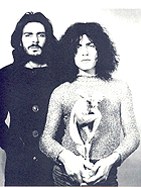
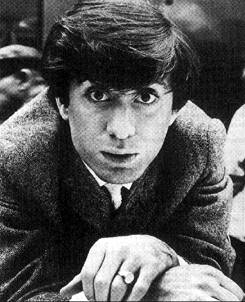
Riggs O’Hara’s play ‘Noel Coward
in Poland’ was performed in August as part of the Portobello
Arts Festival. He was also a special guest at the PRS ceremony
on 15 September 1997, where he was re-united with Harry Feld
for the first time in three decades. Interview by Martin
Barden Ó 8/97. No reproduction without written
permission.
see the same page in French
main menu , records , concerts , TV
appearances
, Recordings , Films & Videos , Press
reviews & pictures , Covers &
Tributes
, Useful
Links
© Pierre Champion 2001



 Toby Tyler was a name from a comic book or
something. He was just looking for a name that was theatrical.
Toby Tyler was a name from a comic book or
something. He was just looking for a name that was theatrical. in restaurants and went to first nights.
It was a very formative period of his life at 16 and 17... He
always left his things at home, but if he found somewhere else
to stay for a while, he stayed there.
in restaurants and went to first nights.
It was a very formative period of his life at 16 and 17... He
always left his things at home, but if he found somewhere else
to stay for a while, he stayed there. the only thing you needed no
qualifications for was the pop industry, none whatsoever.
the only thing you needed no
qualifications for was the pop industry, none whatsoever. 





 My dear Pierre,
My dear Pierre,
